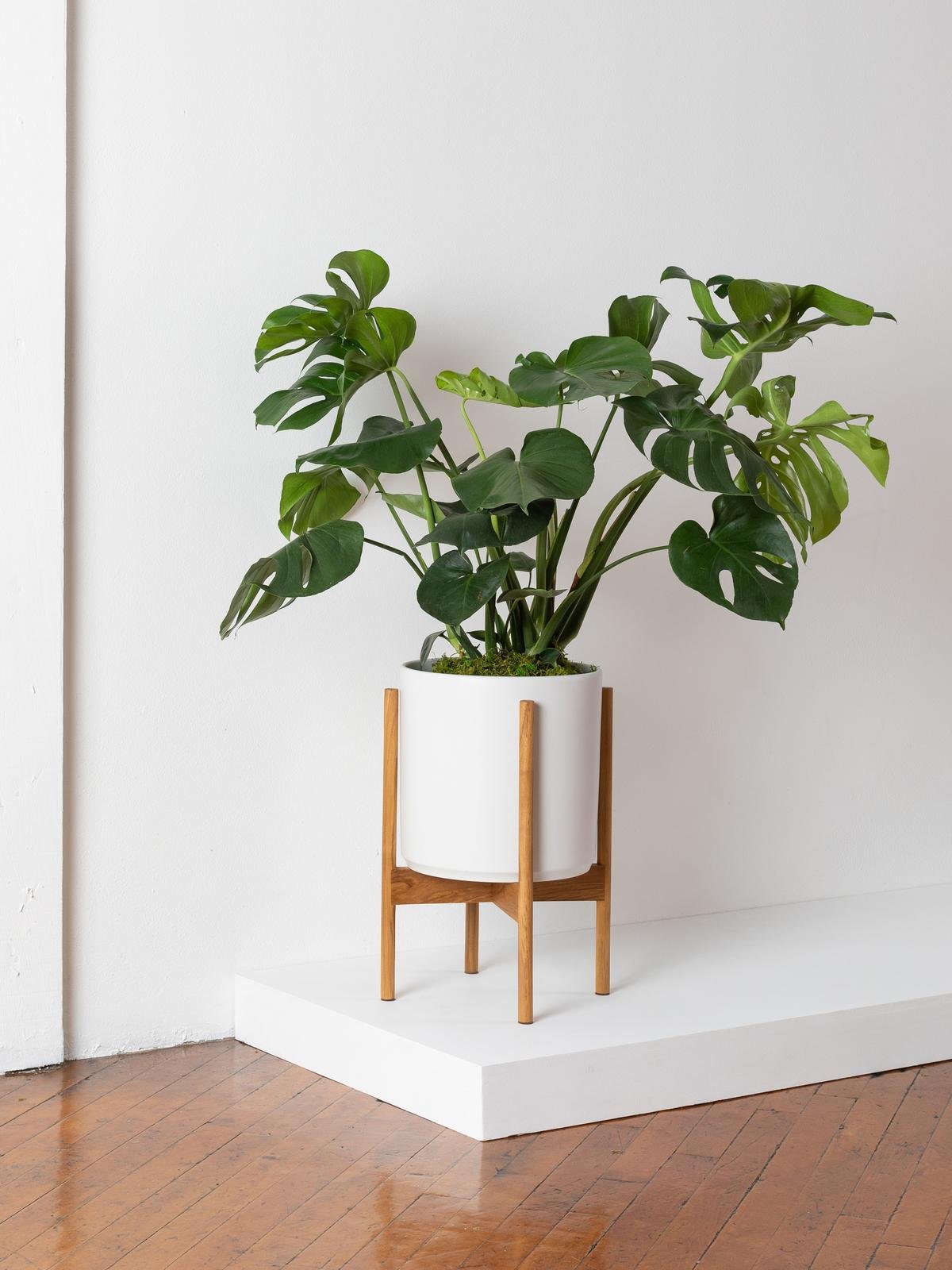What You Need To Know Before You Buy A Monstera
A low maintenance houseplant with unique split leaves, it’s no surprise that the Monstera Deliciosa has risen to popularity in the last few years. Also known as the Swiss Cheese Plant and (erroneously), the split-leaf philodendron, read up on what makes this plant so special, and what you should know before bringing one into your home.
Are Monsteras easy to care for?
The Monstera Deliciosa is considered an easy-care plant, requiring very little attention to grow full and lush in your home over time. This low-maintenance beauty does well with a regular watering routine and bright indirect light.
Monsteras like to climb
The Monstera is a natural climber: in the wild, it uses its aerial roots to attach to trees or branches nearby, growing upward towards the light.
You can also train your Monstera to climb by providing it a stake or moss pole. Read our full post on how to stake your Monstera for climbing here.
Not all the leaves on your Monstera will have splits
Wondering where the splits are on your Monstera? Sometimes Monsteras grow leaves without holes, and that’s just fine! Usually the main reason for a Monstera’s leaves not having splits is maturity: young plants simply need to grow more. As your plant matures, keep in mind that more light will lead to larger leaves with more splits.
Where should you put your Monstera?
Monsteras thrive in areas with bright indirect light, though they can adapt to medium light as well. Avoid putting your Monstera in direct sunlight as its leaves will burn.
Monsteras can live outside, but not in direct light
Depending on your area’s climate, your Monstera may do just fine outdoors. Monsteras are tropical plants, though, so if you live in an area that freezes, your Monstera will like to be outside in the summer. If you move your Monstera from indoors to out, be sure to do it gradually, slowly moving it to a brighter spot each day. Never put Monsteras in harsh direct sunlight.
are Monsteras safe for pets?
Monsteras are unfortunately toxic for cats and dogs. That said, they have a relatively low toxicity, and unlike some other plants, will not cause major harm to your pets unless copious quantities are ingested. Read about how to keep your pets off your plants here.
Are Monsteras fast growing?
With the right care, Monsteras are very fast growing plants. They need bright indirect light to grow fast, and will grow more slowly in medium to low light. On average, Monsteras will grow around 2 feet per year. Be sure to regularly fertilize your Monstera for faster growth!
How To Select A Healthy, Thriving Monstera Plant
When you're in search of the perfect Monstera Plant, focus on finding one with a well-balanced canopy of vibrant, lush leaves, steering clear of specimens displaying yellowing or leggy foliage. Optimal Monstera leaves boast a deep green hue and, with the exception of new leaves, a certain firmness. While one or two yellow leaves is fine, generally the plant should have all green leaves that should stay firmly attached when gently shaken or pulled. Additionally, inspect the soil for any presence of invasive pests, as these can serve as indicators to explore alternative plant options.
Avoid Purchasing Your Monstera Plant From a Garden Center
Investing in a Monstera Deliciosa plant is a significant commitment, and it's essential to ensure you get value for your money. While seeking a budget-friendly option may seem tempting, opting for the lowest-priced Monstera can lead to future disappointments. The overall beauty, aesthetics, and fruiting capability of your Monstera are intricately tied to its health, which, in turn, depends on the care it receives—both before and after you bring it home. Choose a Monstera from a reputable, high-quality grower who meticulously tends to their plants, rather than relying on garden centers, where attractive price tags may come with no guarantee of pest-free, well-tended health.
Plants at garden stores often receive uniform water, light, and care, irrespective of their species. This one-size-fits-all approach is less than ideal for Monsteras, which are sensitive to overwatering. The routine watering practices in garden centers, with a daily deluge from a hose that may affect neighboring plants, do not benefit Monstera plants.
When acquiring a larger Monstera from a garden center, the transportation process may involve jostling the plant into your vehicle. Exposure to your car's heater or air conditioning during transit can subject the plant to environmental stress, hindering its recovery. Opt for a trusted supplier that handles transportation efficiently, saving you both money and energy in the long run. Although the initial cost may be slightly higher, the assurance of a healthier, well-cared-for Monstera is well worth the investment.
Discover the Monstera Deliciosa
A unique, easy care plant to add an attractive lushness to any space.



